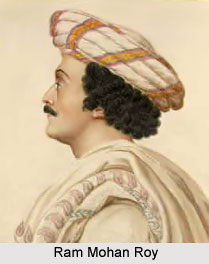 Religious reforms of Raja Ram Mohan Roy, like other reforms introduced by him, have helped India to attain freedom of expression in many ways. In the initial days, his differences with his father regarding the concept idol-worship took a serious turn. He was man who though for him. In the Upanishads and Vedas there are writings on freedom of thought. Ram Mohan admired this spirit of freedom. He proclaimed that simple living and high thinking should be a man`s motto in life. And he lived accordingly. Ram Mohan always believed that God does not reside in idol and vehemently opposed idol worship.
Religious reforms of Raja Ram Mohan Roy, like other reforms introduced by him, have helped India to attain freedom of expression in many ways. In the initial days, his differences with his father regarding the concept idol-worship took a serious turn. He was man who though for him. In the Upanishads and Vedas there are writings on freedom of thought. Ram Mohan admired this spirit of freedom. He proclaimed that simple living and high thinking should be a man`s motto in life. And he lived accordingly. Ram Mohan always believed that God does not reside in idol and vehemently opposed idol worship.
After finishing his studies Ram Mohan worked for British East India Company at many places in Bengal, before settling in Kolkata in 1815 - year of Battle of Waterloo. He had already published several books by then. First among his books were written in Persian language with the preface written in Arabic. It was a direct attack on idol worship.
After he moved to Kolkata, Ram Mohan became very much involved in social and literary works. He even translated the Upanishads written in Sanskrit language into Bengali language. He also published several work in English condemning the Sati, and also indulged in debates with traditional scholars on the rights of Hindu women.
He also contested the assertions of Christian`s missionaries that their religion was better to all others. He in the year 1815 founded the Atmiya Sabha or Friendship Association, as it is also known as, among other things, he went in search for elements common to various religious traditions.
By this time, Ram Mohan himself came to believe in the concept of omnipresence of God, who is the only proper object of religious veneration, is one and undivided in person. He also stated that this was the very message of Vedic literature and of the Bible and Holy Quran as well. He started to promote messages about inter-religious understandings and in the process wrote a book on precepts of Jesus Christ and began to work on life of Prophet Muhammad.
While he was involved in the process of revolution, he was roundly abused by traditional Hindus, who derided them as sinful atheists and moderns blinded by passions. He was not supported by the British as well. They criticized that he resisted conversion and that his high regard for Jesus did not expand to acknowledging his religion.
Roy in the year 1816 opened a school for boys, whose medium of instruction was English. In 1821 he started a weekly newspaper in Bengali language (first of its kind in any Indian language). Thereafter he started a paper in Persian as well (of which, as with its Bengali predecessor, he wrote all the contents). He founded the Brahmo Samaj (the Society of God), in 1828 which sermonized the love and worship of the One God on the basis of what its creator claimed were the innovative wisdom of Vedas.
Ram Mohan Roy`s Regard for Hinduism
There were, however, some Christian priests who were happy at Roy`s enthusiasm and interest for doctrines of Christianity. They even suggested that he should convert to Christianity. These priests could not understand mind of Ram Mohan who was staunch believer of Hinduism. He had immense admiration and respect for Vedas and Upanishads in Hinduism religion, which he had studied deeply.
Some men spoke lightly of the Vedas and the Upanishads. Ram Mohan gave them a very clear answer: "There is only one God in the universe. He has no form and qualities which men can describe. He is full of joy. Every living being has an element of God. These noble ideas sparkle in the Upanishads. Moreover, these books support people to reflect for themselves, they strike out original paths. They do not chain man`s intelligence." Just as he damned the dreadful customs of the Hindus he condemned the superstitions of the followers of other religions.






